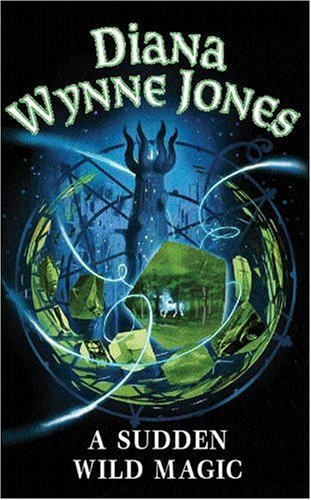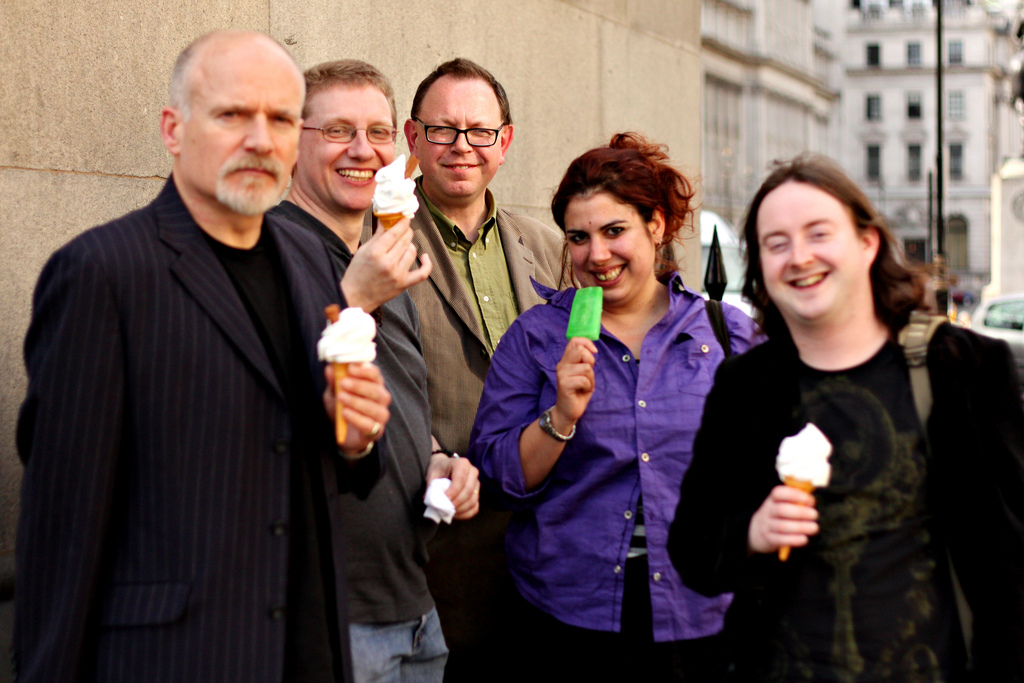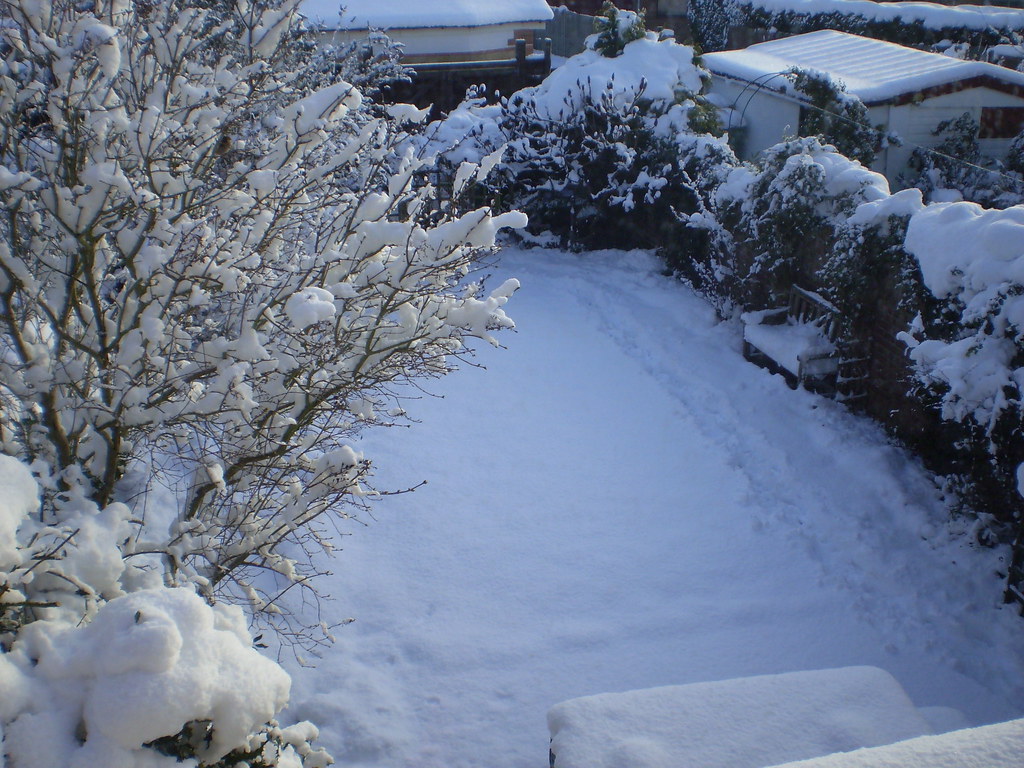 Diana Wynne Jones (16 August 1934 – 26 March 2011)
Diana Wynne Jones (16 August 1934 – 26 March 2011)
Shortly before I went to Bologna, Diana Wynne Jones lost her battle with cancer. She was 77 years old.
Diana had a very strange childhood, she and her sisters were neglected by her parents. Her autobiography can be found on her authorised website and the story of her childhood is essentially that of the four girls in The Time of the Ghost. Most peculiarly, her educated literate parents didn’t provide books!
Diana wrote:
…my father was inordinately mean about money. He solved the Christmas book-giving by buying an set of Arthur Ransome books, which he kept locked in a high cupboard and dispensed one between the three of us each year. Clarance House had books, he said. True: it had been stocked mostly from auctions and, from this stock, before I was fourteen, I had read all of Conrad, Freud’s Interpretation of Dreams, Bertrand Russell on relativity, besides a job lot of history and historic novels – and all thirty books from the public library in the guildhall. Isobel and I suffered from perpetual book starvation. We begged, saved, and cycled for miles to borrow books, but there were still never enough. When I was thirteen, I began writing narratives in old exercise books to fill this gap, and read them aloud to my sisters at night. I finished two, both of epic length and quite terrible. But in case someone is tempted to say my father me a favour, I must say this is not the case at all. I always would have been a writer. I still had this calm certainty. All these epics did for me was to prove that I could finish a story. My mother was always telling me that I was much too incompetent to finish anything. During her ugly, semi-delinquent litanies she frequently said, “When you do the Oxford exams, you’ll get a place, but you won’t do better than that. You haven’t got what it takes.”
Fortunately for Diana and for the world, she was never shaken from that calm conviction she was an author. Once she had escaped from the privations of childhood, she flourished. She married and had a family of her own and once her children were in school she set about the business of writing books.
Diana may be gone but those wonderful books remain. I remember howling with laughter over Howl’s Moving Castle at ten. (The scene where Sophie massacres Howl’s suits: “Give it here, all seven of it.”) I read Fire and Hemlock in the same year as I read Margaret Mahy’s The Changeover and those two books have influenced my writing ever since, making me a ‘magical realist’ author, inspired by both of those fine writers.
I’ve already posted about Diana’s work on my blog. She will always be one of my favourite authors. As I said earlier The Homeward Bounders and A Tale of Time City are two of my favourites. But other favourites include the Chrestomanci series (especially The Lives of Christopher Chant and Witch Week); the Howl series, particularly the first book, Hexwood, Fire and Hemlock and Archer’s Goom. There are just so many good novels, each brimming with originality, serious and humorous at once.
The title of ‘A Sudden Wild Magic’ expresses this quality of untamed imagination, which is why I’ve chosen it to illustrate this blog post. Diana will be much missed but she is also, rightly, much celebrated. Strange Horizons have posted a requiem in links to the various posts and obituaries of Diana. There’s so much to celebrate in an author who achieved so much and gave so much happiness to the world.
Diana said: Each book is an experiment, an attempt to write the ideal book, the book my children would like, the book I didn’t have as a child myself. I have still not, after twenty-odd books, written that book. That’s a feeling any writer will recognise. But it’s not the sense that a reader has when surveying shelves laden with so many fine novels.
 I’ve been on a book buying binge. I blame Amazon recommendations – which were actually spot on for a change instead of suggesting books based on presents I bought for other people. I came back from Wales to a heap of oblongs all for me:
I’ve been on a book buying binge. I blame Amazon recommendations – which were actually spot on for a change instead of suggesting books based on presents I bought for other people. I came back from Wales to a heap of oblongs all for me:
 Public libraries all over the UK have been threatened with closure. Some have closed already, other closures have been announced, still more are in danger of being closed. Almost 400 libraries nationwide are already threatened with closure, and the total could reach an estimated 800. Instead of considering libraries an essential public service, the Conservative government wants to axe them under the assumption that volunteers will step in and run them instead. (This same argument has been applied to other public services; where the government thinks all these volunteers will come from during a recession, I don’t know.)
Public libraries all over the UK have been threatened with closure. Some have closed already, other closures have been announced, still more are in danger of being closed. Almost 400 libraries nationwide are already threatened with closure, and the total could reach an estimated 800. Instead of considering libraries an essential public service, the Conservative government wants to axe them under the assumption that volunteers will step in and run them instead. (This same argument has been applied to other public services; where the government thinks all these volunteers will come from during a recession, I don’t know.) Libraries will always be important to me. Between the ages of 11 and 15 I was miserable at school. A series of substitute teachers, bad teaching and uncaring school management meant I wasn’t learning anything and was being lazily bullied by a group of students with nothing better to do. But bullies very rarely follow you into libraries. I took refuge in my school library at first and then later in my local library. When I eventually got into trouble for persistent truanting, the trouble wasn’t as bad as it might have been because while I wanted to escape, the place I escaped to was a safe and supportive one. (The librarians twigged that no child has a school project that lasts from 9-4 for weeks and weeks.)
Libraries will always be important to me. Between the ages of 11 and 15 I was miserable at school. A series of substitute teachers, bad teaching and uncaring school management meant I wasn’t learning anything and was being lazily bullied by a group of students with nothing better to do. But bullies very rarely follow you into libraries. I took refuge in my school library at first and then later in my local library. When I eventually got into trouble for persistent truanting, the trouble wasn’t as bad as it might have been because while I wanted to escape, the place I escaped to was a safe and supportive one. (The librarians twigged that no child has a school project that lasts from 9-4 for weeks and weeks.)




